Pineapple Trivia on World Pineapple Day!
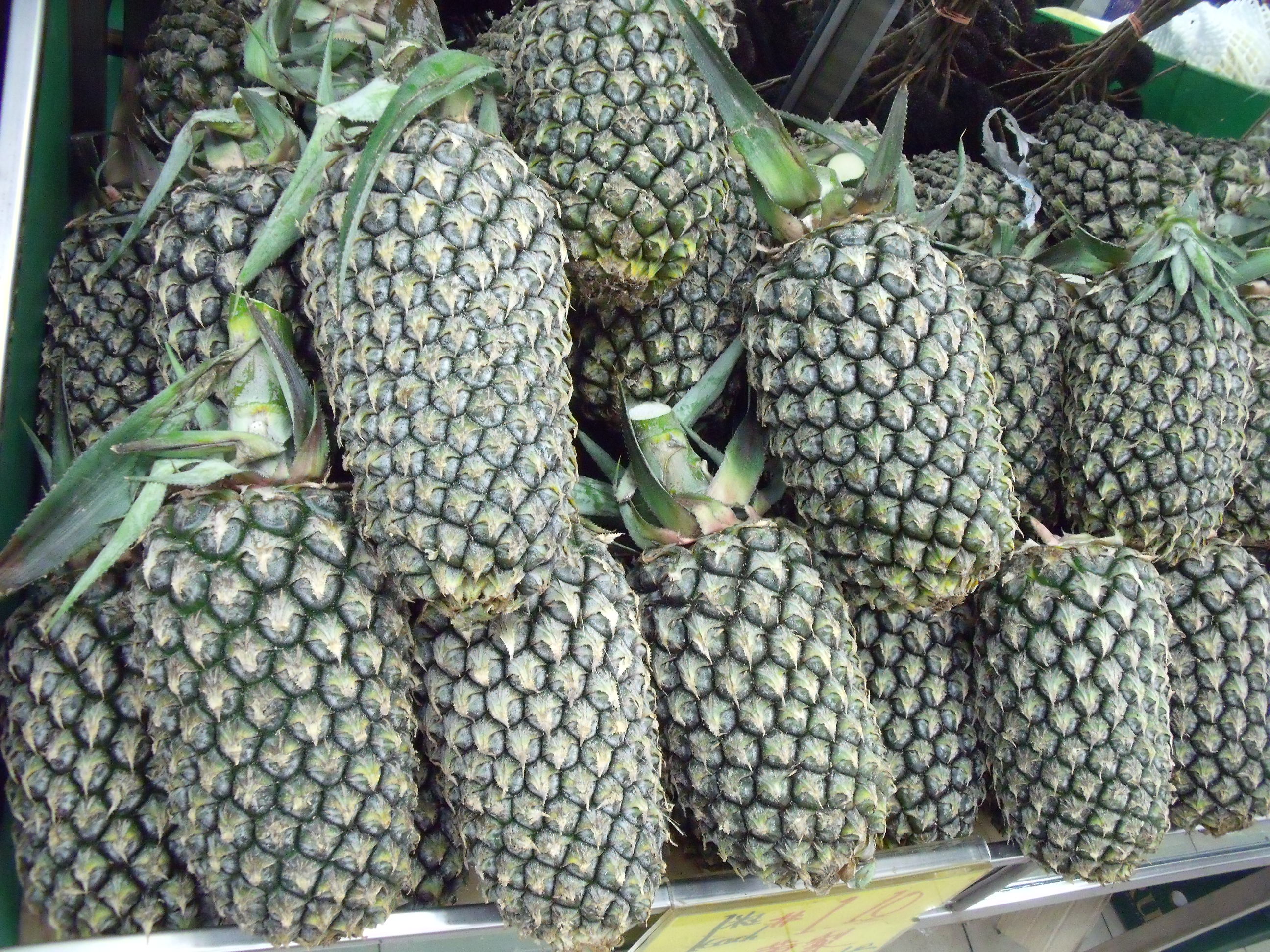
Today, June 27th, is World Pineapple day! At PfD we love this sweet, tangy, and delicious fruit, which has been integral to our efforts to promote economic growth in Benin. In this West African nation, Pineapples are the third most valuable crop in terms of GDP. Our Pineapples for Export (PINEX) project, launched in 2015, aims to strengthen all levels of the Beninese pineapple value chain.
Through activities such as building producers’ technical capacity and improving their access to resources (i.e. capital), PINEX is enabling the Beninese pineapple industry to increase productivity, improve quality, and increase exports. As Benin is heavily dependent on its agricultural trade, the Pineapple industry is improving the livelihoods of the Beninese people, and to us at PfD this is cause for celebration!
Pineapple Trivia!
Last year, we brought you 5 things you didn’t know about pineapples. This year, we have prepared pineapple trivia to test your knowledge!

#1 Pineapples are native to ____________.
- Sub-Saharan Africa
- East Asia
- South America
- North-Africa
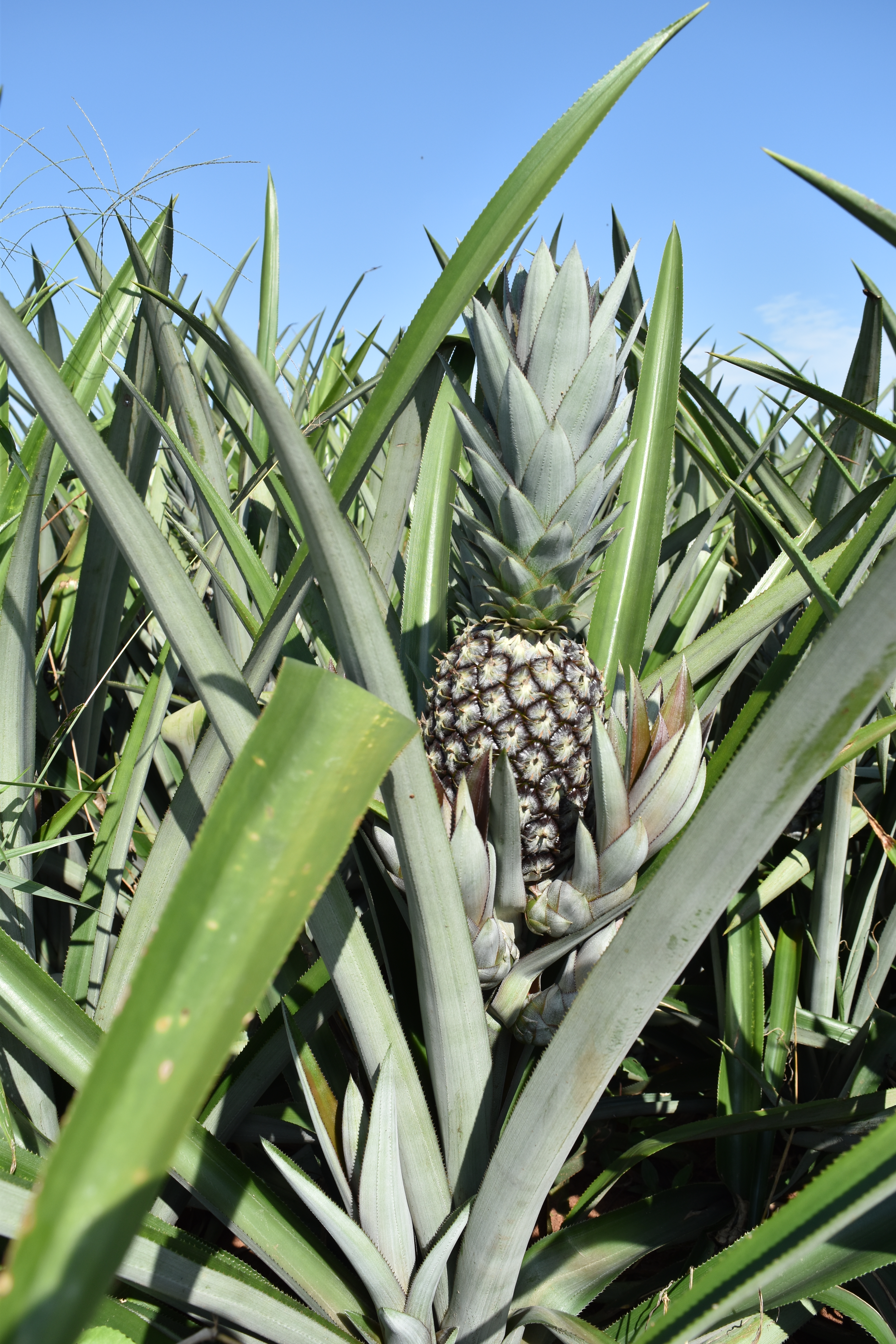
#2 Which country exports the most pineapples
- Costa Rica
- Benin
- South Africa
- Netherlands
#3 In which region are the majority of the world’s pineapples grown?
- Europe
- South America
- Southeast Asia
- Central America
#4 Once harvested, pineapples ripen within a week.
- True
- False
#5 The skins, core, and ends of a pineapple can be used to make which of the following?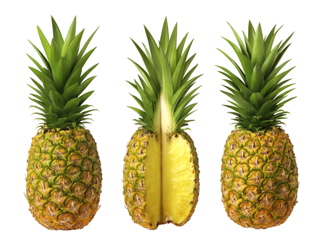
- Alcohol
- Vinegar
- All of the above
- None of the above
#6 What color are the pineapple plant’s flowers?
- Red
- Yellow
- Orange
- Trick question, pineapple plants don’t have flowers
Extra Credit Question
#7 What is your position on the age old debate about whether or not pineapple an appropriate pizza topping?
- I love some pineapple on my pizza!
- Pineapple does not belong on pizza!
- I can write you an essay about my stance
- I am undecided on the issue
Below are the trivia answers. Find out how you did!
#1 C #2 A #3 C #4 False #5 C #6 A

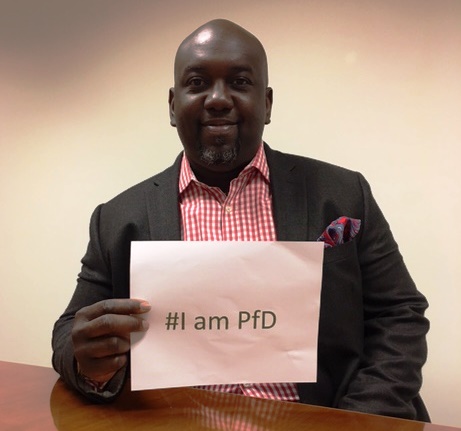
As humans, we are constantly making decisions in pursuit of fulfillment. For me, fulfillment means finding a way to serve and give back in a meaningful way, not just mere handouts. Partners for Development (PfD) is enabling me to achieve that. I am very lucky to be able to serve with an organization that is in alignment with my values and principles. My employer, the National Cooperative Bank (NCB), a mission-driven organization, also supports PfD. Lanre Ayedun, an amazing friend, past PfD employee, and current PfD Board member, introduced me to PfD and all the good work that PfD does. And I am so glad that she did.
 It’s impossible to pinpoint just one aspect of what PfD does as most impressive. How do you choose between nutrition training or capacity building or training and micro-credit or women’s empowerment or scholarships? That said, the common thread that ties all of PfD’s programs together is the inclusion of local partners in all aspects of their work. That, combined with the dedication and drive of staff, is what sets PfD apart from the others. It’s why I support PfD and why I think you should too.
It’s impossible to pinpoint just one aspect of what PfD does as most impressive. How do you choose between nutrition training or capacity building or training and micro-credit or women’s empowerment or scholarships? That said, the common thread that ties all of PfD’s programs together is the inclusion of local partners in all aspects of their work. That, combined with the dedication and drive of staff, is what sets PfD apart from the others. It’s why I support PfD and why I think you should too.
PfD’s commitment to development through training, capacity building, and overall empowerment is both sustainable and effective. I am passionate about the fact that PfD does not give fish but teaches people how to fish and then provides the resources needed to fish. PfD gives micro-credit to individuals through local partners thereby creating several levels of empowerment. For example, PfD and it’s partners are empowering women entrepreneurs: an investment that benefits families, communities, and future generations.
Should you become a PfD supporter? From my perspective, supporting PfD is the right choice for anyone that wants to make a difference in the world. Become a partner for development – take the step and contribute today. All of our donations combined will make a difference – it’ll help send a girl to school, provide clean water for a community, and prevent malaria in a village.
Put your money where your heart is. #IamPfD, are you?
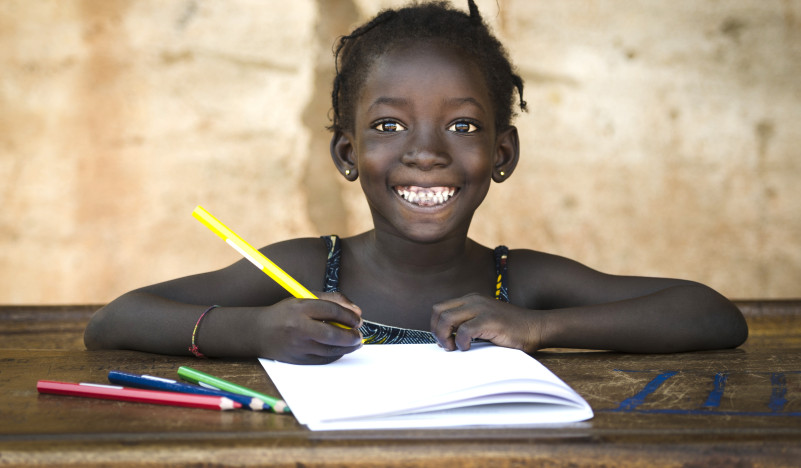
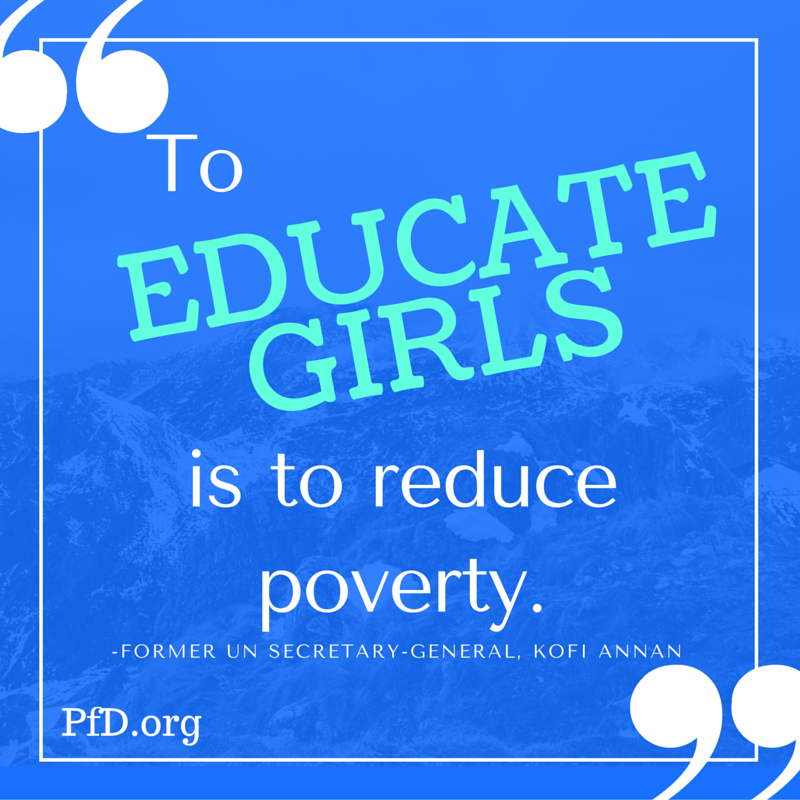
The current literacy rate for females in Nigeria is approximately 20% lower than it is for males1. Girls also spend an average of eight years in school throughout their lifetime in comparison to girls in the United States whom spend an average of 17 years. With secondary education in Nigeria costing around $500.00 annually, many young girls are unable to advance beyond elementary education without additional support. 70% of Nigerians1 also live below the poverty line and it may be quite difficult to use excess funds towards furthering their child’s education. With the help of your donation to the Scholarship Fund, PfD can significantly reduce the financial strain on families in order to continue to pay for education for their children.
Meet Lucy, one of the newest recipients of the Anne Johnson Memorial Scholarship Fund. Lucy is 12 years old, the second of three children and ranks at the top of her class. Lucy aspires to educate other young children one day by becoming a Mathematics lecturer after her studies. She is currently studying twelve subjects and loves learning at school, reading, and mathematics. All of Lucy’s textbooks for her numerous classes were provided by the Anne Johnson Memorial Scholarship Fund (AJMSF). Lucy’s dreams are much more of a reality with the help of AJMSF. Lucy’s mother, Mrs. Ifeoma, was so grateful to PfD for giving her daughter the opportunity to help further her education and promised to continue to encourage her daughter to do well in her studies and stay in school.
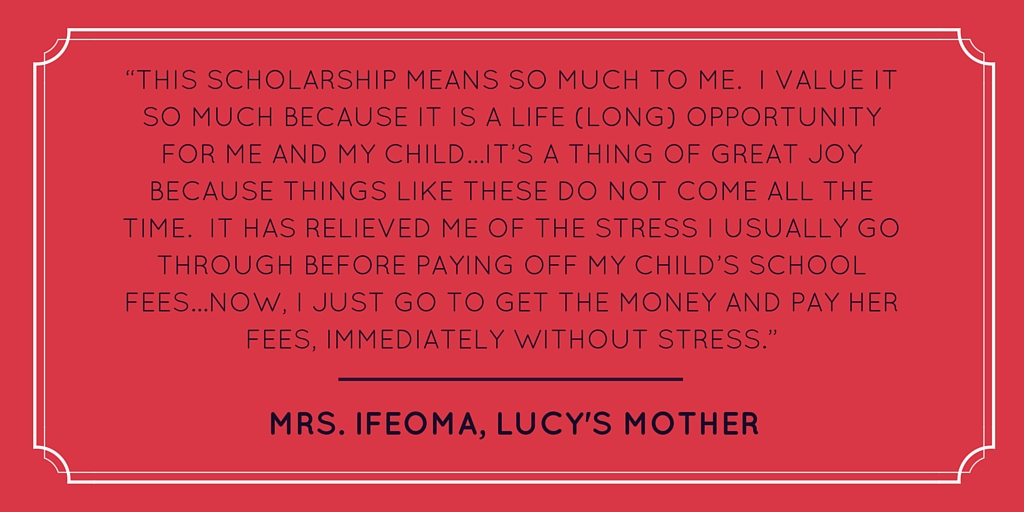
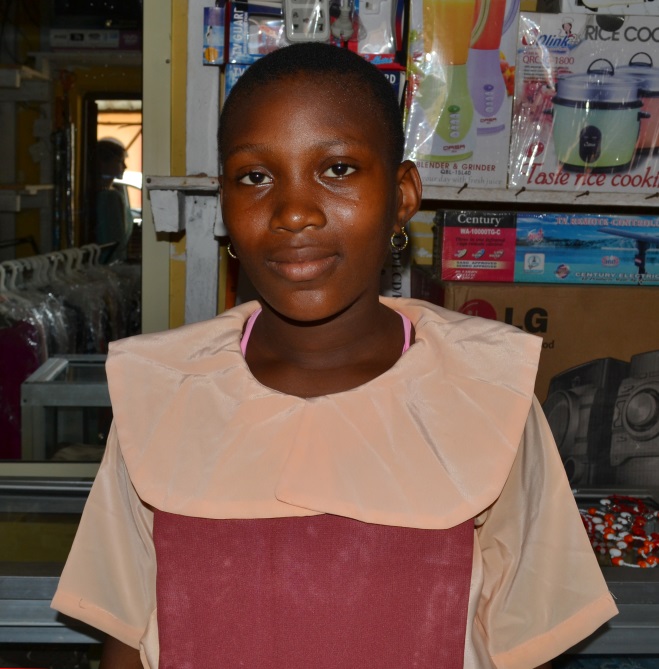 The Scholarship Fund that Lucy received was created in memorial of Anne Johnson, former PfD Country Program Director. Initially PfD, in partnership with Life Above Poverty Organization (LAPO), set a target of $20,000.00 annually to support the Scholarship endowment. However, in August 2015, less than one year after the AJMSF began, friends, family members and three institutions donated close to $30,000 in her memorial.
The Scholarship Fund that Lucy received was created in memorial of Anne Johnson, former PfD Country Program Director. Initially PfD, in partnership with Life Above Poverty Organization (LAPO), set a target of $20,000.00 annually to support the Scholarship endowment. However, in August 2015, less than one year after the AJMSF began, friends, family members and three institutions donated close to $30,000 in her memorial.
Since 2014, 26 Nigerian girls have been awarded scholarships from the AJSMF to support their secondary education. Each year, drawings are held to decide on the winners because there were so many girls who qualify for scholarships based on economic need. Staff members from LAPO and PfD meet with the winners a few times a year to track their successes in school since receiving the scholarship fund. Past AJMSF recipients have graduated from secondary school and will continue to receive support from PfD to further their education.
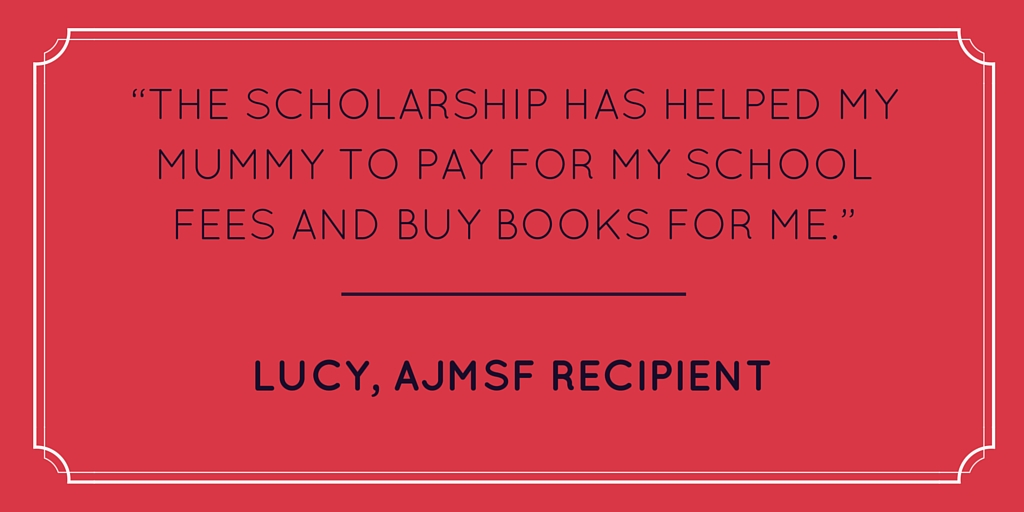 In the future, PfD and LAPO plan to give other young girls like Lucy the opportunity to help pay for secondary school and achieve their educational aspirations. To support more girls like Lucy donate $250 to the Scholarship Fund today.
In the future, PfD and LAPO plan to give other young girls like Lucy the opportunity to help pay for secondary school and achieve their educational aspirations. To support more girls like Lucy donate $250 to the Scholarship Fund today.

World Environment Day (WED) has been an annual call to action since 1974. WED is a widely celebrated event that allows individuals in over 100 countries to bring public awareness to the biggest issues affecting our environment. In just the past five years, this day has highlighted numerous urgent issues ranging from a greener global economy, raising awareness for climate change, reducing the growth rate and preserving the planet’s resources. Above all though, WED serves as the “people’s day” so we as individuals can be a representative of change and inspire our global community to take better care of our Earth.
Our name, “Partners for Development (PfD)” summarizes our approach of working with various groups of people to achieve sustainable change. We deliver those sustainable solutions by focusing on three key areas: healthy communities, economic empowerment, and agricultural development. PfD’s project in Benin is a great example of how our organization is not only raising awareness, but also bringing about change to improve our global environment. PfD is training local farmers to increase harvests through better growing techniques. Those strategies that coincide with WED’s vision of creating a more sustainable environment included decreasing harvest spoilage, appropriating the use of pesticides and improving water and soil resources. Through our work in Benin, PfD has accomplished the following:
● 60% of farmers participating now use pesticides in a safer and more effective manner by utilizing strategies such as proper dosage and eliminating unnecessary environmental health hazards.
● 21 solar dryers were used during cooking demonstrations with farmer groups to enable them to continue with eco-friendly post-harvest vegetable processing activities.
● We successfully tested two solar irrigation pumps that are able to reduce irrigation cost and pollution in Northern and Southern Benin.
PfD is celebrating this World Environment Day by continuing to make a difference in the world by improving the quality of life and collectively changing behaviors to support sustainable lifestyles. PfD envisions a more just, peaceful, and environmentally sustainable world and partners with local organizations to bring upon lasting change.

Would you like to make an impact on World Environment Day? Show your support by sharing on social media and tagging @Partners4dev on Twitter or following us on Facebook.
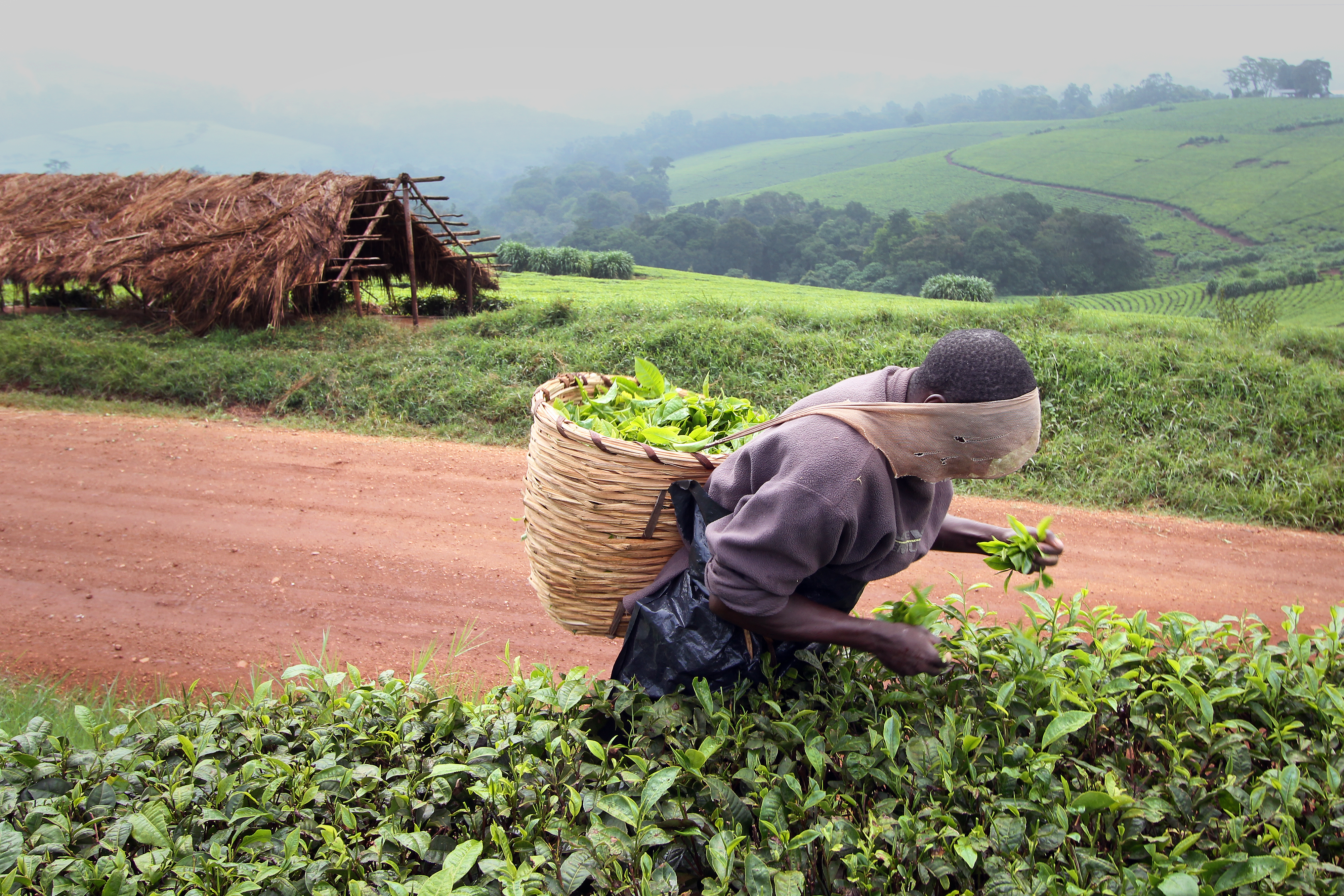
Mr. Cyprien Hindeme is a vegetable farmer in Southern Benin. He supported himself and his family by growing and selling vegetables and pineapples. Like many farmers in Benin, Cyprien was never formally trained in cultivation techniques or marketing.
Cyprien participated in PfD’s GREEN project trainings, which taught him modern cultivation techniques to improve his vegetable crops and other important farming skills such as the proper use of chemical fertilizers and pesticides. Through the practical marketing workshops, he also learned how to become market orientated in his production and continues to use the weekly vegetable prices he receives through SMS messages on his cell phone to negotiate sales of his cabbages and other vegetables even before they reach the local markets. This not only ensures he gets the best prices for his produce, but it also cuts down transportation time and costs and reduces post-harvest losses.
Cyprien also saw an opportunity for his pineapple grove. After witnessing the success of the GREEN project techniques with his cabbage, Cyprien decided to use this knowledge and skills to improve his Sugar Loaf pineapple production.
He modified his use of fertilizers and insecticide to be in line with GREEN recommendations, resulting in larger, juicer pineapples. He also used his learned marketing skills to research the local and regional pineapple markets and diversify his clients. Now Cyprien delivers his higher quality pineapples to wholesalers in Togo and Burkina Faso, while still servicing his local market buyers. He also now supplies his top quality fruit to three prominent hotels in the Atlantique Department. Altogether, these sales generated 1,200,000 CFA ($2,400 USD) for Cyprien during harvest time.
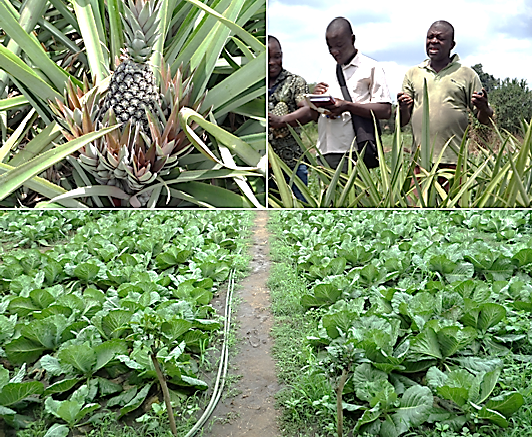 With this additional income, Cyprien sent one of his children to Benin’s agricultural technical college, ensuring his future and the continued success of his family’s farm. He also bought laptop computers for both of his children attending university, enabling them to develop marketable computer skills.
With this additional income, Cyprien sent one of his children to Benin’s agricultural technical college, ensuring his future and the continued success of his family’s farm. He also bought laptop computers for both of his children attending university, enabling them to develop marketable computer skills.
Cyprien is just getting started, saying, “now that GREEN helped me with my cabbages and pineapples, now I am ready to try other crops too.”
Cyprien’s drive to build a better life for himself, his family, and his community, allows him to proudly declare #IamPfD.
Throughout all of December we will be sharing stories from our staff, board, partners, and others from around the globe. We can’t wait to share all of the hopeful, engaging, and positive stories from our work. We will be using the hashtag #IamPfD on Facebook, Twitter and LinkedIn.

Be sure to share the posts that you find engaging and inspiring with friends and family and don’t forget to donate and take an #unselfie of you making a donation and share it with us and use the #IamPfD for a chance to win prizes from PfD.
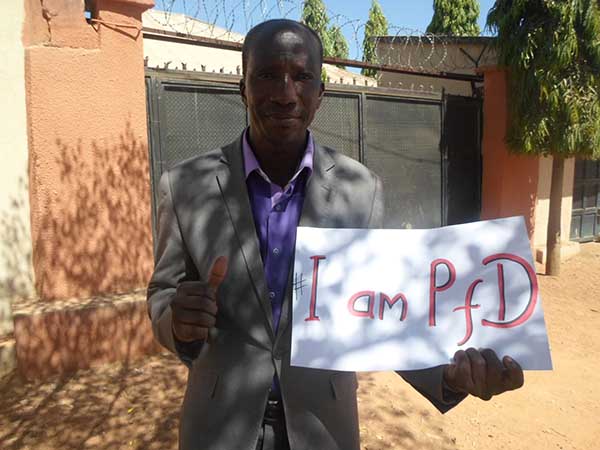
 PfD gives the greatest importance to the role of partners in every aspect of our work. We are deeply committed to involving local counterparts in assessing needs, designing programs, implementing activities and learning from the communities we jointly serve. PfD’s partner-oriented approach directs us to work with and harness the resources of the international community to meet the needs of vulnerable populations. Therefore, during our December campaign we wanted to feature one of our partners. Below is a Q&A with Pastor Ayuba Musa from Gerawa Women Multi-purpose Cooperative Society from Bauchi state, Nigeria.
PfD gives the greatest importance to the role of partners in every aspect of our work. We are deeply committed to involving local counterparts in assessing needs, designing programs, implementing activities and learning from the communities we jointly serve. PfD’s partner-oriented approach directs us to work with and harness the resources of the international community to meet the needs of vulnerable populations. Therefore, during our December campaign we wanted to feature one of our partners. Below is a Q&A with Pastor Ayuba Musa from Gerawa Women Multi-purpose Cooperative Society from Bauchi state, Nigeria.
Q: How did you first learn about PfD?
A: Gerawa Women Multi-purpose Cooperative Society is a community based rural micro-finance organization, base in Bauchi, Bauchi State of Nigeria. The organization got to know about Partners for Development in 2004. Prior to this time, Gerawa has been engaging in micro-credit program in the State at an elementary or infant stage. The institutional capacity of the organization to operate effectively and efficiently and the knowledge on micro-credit standard best practice was low. The capacity of the organization to access loan to finance its clients was low, with low portfolio strength of USD $15,000, out of which 80% of the loans were in arrears. It was at this stage that the organization team up with PfD.
Q: What led you to work with PfD?
A: Gerawa was so fascinated with PfD’s programs in Bauchi state which cut across (a) rural infrastructure development (b) small enterprise development i.e. micro-credit (c) health i.e. Reproductive health (d) and institutional capacity development/building. Taking the capacity challenge of the organization into consideration, Gerawa requested support with the micro-credit program in order to meet the need of our clients and reduce poverty level among the rural and vulnerable household women in the State.
Q: Tell us about the growth of your organization?
A: After over 10 years of good partnership with PfD, Gerawa has grown from lending USD $12,000 to $112,000 per year. Apart from micro-financing, the organization has equally benefited from the following PfD project activities:
Reproductive health training and support
- Integrated health and microfinance programming
- Expanded access to services for agricultural enterprise
- Business development skill training
- Nigeria Agricultural Enterprise Curriculum (NAEC) training and support
All these projects targeted rural women to improve their skills, increase sales and improved income. The uniqueness of implementing PfD project in the communities is integration approach to project delivery, which allows beneficiaries to access and enjoy more than one intervention at a time – holistic development.
Q: How has this partnership impacted your work?
A: The impact of the project implemented with PfD over years resulted in:
Improved Micro-finance: To date, we have issued over 3,200 microcredit loans mainly to women – 95% of borrowers are women.
Institutional capacity development of the organization: At the start of the project with PfD, an operational grant of over a million naira was received from PfD to complement staff salary and other administrative overheads. Likewise, trainings, seminars and workshops were organized by PfD to build the capacity of the implementing staff of the organization in project delivery and methodology so that we could sustain the work after the completion of the grant.
Supporting women farmers: We were able to strengthen the capacity of more than 2,000 small agricultural business holders, who were mainly women, to effectively plan, save, record, forecast, and negotiate properly for their products.
Successful program integration of health and microfinance: A total of 48 communities were reached and 2,747 women borrowers received health training and information, 11,420 immunization were given, 980 women of reproductive age received family planning commodities, 3,620 attended anti-natal care and 122 received various counseling on RH related issues.
Q: Any closing thoughts?
A: In conclusion, PfD has done great things in transforming the lives of ordinary people for the better, but there is still more to be done, thousands and millions of unreached ones are still plaguing in abject poverty and dying daily. PfD still needs more support to be able to continue doing the good work and be able to reach the less privileged.
Throughout all of December we will be sharing stories from our staff, board, partners, and others from around the globe. We can’t wait to share all of the hopeful, engaging, and positive stories from our work. We will be using the hashtag #IamPfD on Facebook, Twitter and LinkedIn.

Be sure to share the posts that you find engaging and inspiring with friends and family and don’t forget to donate and take an #unselfie of you making a donation and share it with us and use the #IamPfD for a chance to win prizes from PfD.

“Thanks to the GREEN Project, I sell lots of really good vegetables,” says Bonaventure Odoubiyi, a farmer near the city of Allada whose high quality vegetables have earned him the exclusive clientele of a prestigious hotel in the area. Before his introduction to Project GREEN (GREEN blog post), Bonaventure was a typical vegetable farmer in Benin who grew only local vegetables and followed traditional cultivation methods by using large amounts of cheap, ineffective fertilizer, overcrowding his small plots, and relying exclusively on rain for irrigation. With little bargaining power, Bonaventure sold his produce at the nearest market to whomever he could at whatever price, earning only around 30,000 CFA ($60) a month.
Wanting to develop his business, Bonaventure began attending GREEN trainings, where he learned how to improve the quality of his vegetables and increase crop yields. Through GREEN’s market and business management training, Bonaventure learned about market-driven crop production and how to approach local markets when looking for new clients, leading him to discover the Royal Palace Hotel, an upscale French-owned resort just outside the small city of Allada. To provide for the hotel, Bonaventure began to grow vegetables such as eggplant, radishes and beets, which are not sold on the local market but have a strong clientele with foreign restaurants and hotels like the Royal Palace that tend to pay more for higher quality produce.
Bonaventure engaged the finance and business skills he learned from GREEN to successfully apply for a small loan of $1,000 (500,000 FCFA) from the Federation of Savings and Loans Institution, GREEN’s micro-finance partner. After purchasing a nearby field, he bought a motorized pump to irrigate his crops, and his hard work and investment began to pay off as he saw an improvement in the quantity and quality of his produce. Bonaventure then decided to bring samples of his new crops to the Royal Palace Hotel. Impressed with the quality and variety of his selection, the hotel immediately purchased all of his produce and even offered Bonaventure a contract to continuously supply them with his vegetables.
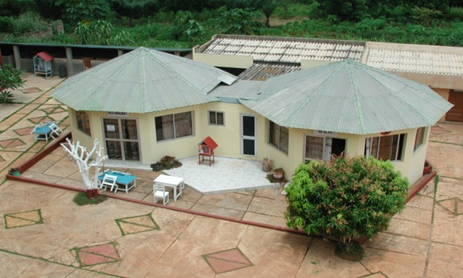
Bonaventure’s business with the hotel grew rapidly, but despite his larger and more productive fields, he still could not meet the demands of the Royal Palace. Consequently, Bonaventure reached out to other GREEN-trained vegetable growers to help him meet the demand. Now, Bonaventure is a farmer, as well as the head of a vegetable supply business. His own crops supply about 30% of the Royal Palace Hotel vegetables, while the rest comes from his network of GREEN farmers. The hotel has been so impressed with the quality of Bonaventure’s weekly deliveries that over the past year they’ve recommended Bonaventure’s produce to another upscale hotel that also offered him a contract for his vegetables.
Bonaventure is proud of his accomplishments, new business and increased income. Thanks to GREEN’s support and training, he now makes nearly $300 USD (150,000 FCFA) each month, five times more than he used to earn. Every time he adds clients to expand his business, he contracts GREEN-trained farmers to help meet the demand. Bonaventure is becoming a successful entrepreneur, and he credits part of his achievement to all of the help and support from the GREEN Project.

With around 70% of Benin’s population dependent on income generated through agriculture and livestock production, and with 35.2% of the population living in poverty, increasing productivity and incomes in the agriculture sector is essential to improving livelihoods in Benin. Farmers in Benin, however, face many challenges including an inadequate supply of inputs such as fertilizers, post-harvest losses of 25% or more, limited market information, and little to no access to credit (USDA GAIN Benin, 2014).
To support Beninese farmers to address these problems, the USDA-funded Growing Resources for Enhanced Agricultural Enterprises and Nutrition (GREEN) Project helps smallholder vegetable farmers improve and increase crop production and expand the sale of their produce. The GREEN Project works directly with local farmers’ associations and organizations and individual farmers, providing them with the training and tools necessary to train farmers to overcome obstacles through improvements in cultivation techniques, increase understanding of value chains and market-driven production, and improve post-harvest management and business skills.
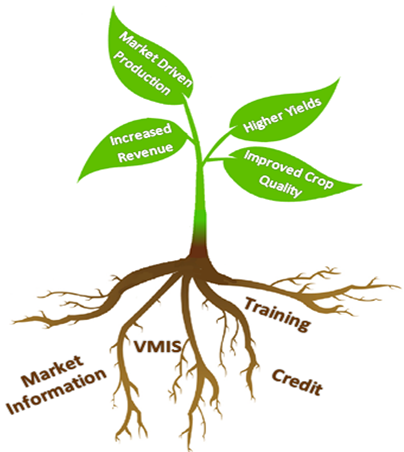
Tell me and I’ll forget; show me and I may remember; involve me and I’ll understand. –Proverb
As shown in the diagram above, the GREEN Model involves four major activities: 1. Hands-on, field-based training; 2. Access to credit; 3.Market information and access; and 4. Vegetable Market Information System (VMIS). Combined, these interventions have led to market driven production, increased revenue, higher yields, and improved crop quality.
Training: Our approach: learning by doing. PFD provides local organizations with resources, knowledge, and training on business, marketing, the value chain and new farming techniques. In turn, these organizations, with their newly acquired knowledge, deliver interactive trainings in the field, giving the farmers the opportunities for hands-on learning. This way, the capacity of local organizations is strengthened as well as the capacity of individual farmers. Through this approach, the GREEN Project has trained over 11,000 farmers in improved cultivation technologies and over 4,000 farmers in post-harvest technologies and value chain approaches.
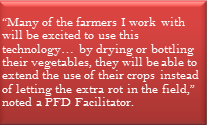 For instance, working with the Agriculture and Food Technology Program, PFD held a week-long hands-on training focused on food processing and preserving. Processing food allows for farmers to sell their products throughout the year, increasing food security. Take tomatoes for example: by transforming part of their tomato crop into tomato purée, farmers are able to stock-up for the off-season when products become expensive and most families are unable to buy the vegetables needed for basic nutrition.
For instance, working with the Agriculture and Food Technology Program, PFD held a week-long hands-on training focused on food processing and preserving. Processing food allows for farmers to sell their products throughout the year, increasing food security. Take tomatoes for example: by transforming part of their tomato crop into tomato purée, farmers are able to stock-up for the off-season when products become expensive and most families are unable to buy the vegetables needed for basic nutrition.
Market Access & Information: GREEN promotes farming decisions based on real-time information. In Benin, many farmers are solely focused on their crops and therefore do not fully understand the value chain. Some farmers have never visited the marketplace where their products sold and crop selection is based on what their family has planted for generations. GREEN’s trainings on the markets and value chain involve trips to the markets to analyze the demand and supply of different vegetables and produce. By actively engaging the farmers in these trainings, PFD and its partners help farmers understand the consumer demands, diversify their crops, expand their markets and ultimately, raise their incomes. For instance, working with the Agriculture and Food Technology Program, PFD held a week-long hands-on training focused on food processing and preserving. Processing food allows for farmers to sell their products throughout the year, increasing food security. Take tomatoes for example: by transforming part of their tomato crop into tomato purée, farmers are able to stock-up for the off-season when products become expensive and most families are unable to buy the vegetables needed for basic nutrition.
PFD, in collaboration with ESOKO a Ghanaian firm, developed a specific vegetable market information system (VMIS) that sends real-time SMS messages of local market prices to farmers, processors, wholesale buyers and sellers. While working in their fields, farmers can access the daily information and better negotiate the prices for their crops. PFD’s VMIS, recently featured at the Agri-Hub Benin Agricultural Finance Fair sponsored by SNV-Benin, registered hundreds of new users.
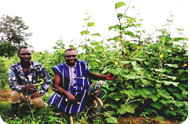
Access to Credit: The GREEN Project expands access to credit to farmers. GREEN partners with local Beninese banks and microfinance institutions and builds their capacity to loan to smallholder farmers. Vegetable Producers Without Bordersfaced real challenges when they began planting in 2009: from insufficient technology such as irrigation systems to an ongoing struggle to find good markets. Enter GREEN. PFD trained the group on how to develop detailed business plans allowing them to access credit which allowed the farmers to increased cultivation from ¼ hectare to two hectares and diversify their crops. Vegetable Producers Without Borders are now on their second loan and have installed an irrigation system allowing them to produce higher quality crops and expand their market to new Beninese towns and even into Nigeria.
By building capacity of both local organizations and individual farmers and by intensively involving farmers in trainings, PFD continues to plant seeds for sustainable and lasting growth in Benin. Through GREEN Project trainings, 96% trainees adopted the improved cultivations methods taught. Targeted farmers’ income also increased, with an over 220% increase in net sales revenue from their vegetables.
Find out more about PFD’s work in Benin and in agriculture.
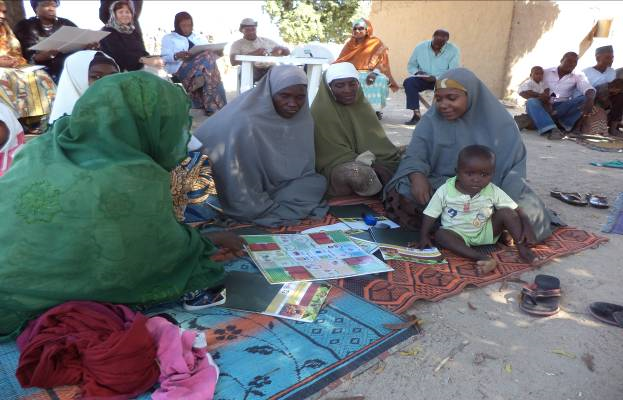
Partners for Development is in its 14th year helping to provide those in need access to credit in Nigeria. PFD currently builds the capacity and provides loans to over 20 local microfinance banks and institutions. Increasing access to credit for impoverished peoples is a proven and successful way to help people break the cycle of poverty. By providing small loans to individuals who are denied traditional loans by banks and commercial loan agencies, PFD provides them with the means to start a business, invest in more and better food resources, pay for school fees, and afford healthcare. From 2001 to 2013, PFD directly issued over $ 2.6 million USD in loans to over 76,128 borrowers in Nigeria. However, our reach is multiplied as local partners have been able to relend funds several times. Over 95 percent of the loans are provided to women.
But, why focus on lending to women?

In Nigeria, especially in rural areas, women are in the background and many do not have a large voice in their communities. The Honorable Hajia Zainab Maina, Minster of Women Affairs and Social Development for Nigeria remarked that although “women constitute about 50 percent of the national population” and “contribute about 60 percent of local food production… their role in promoting economic and social change continues to be inadequately recognized and undervalued.” Further, a 2012 report on gender equality in Nigeria (UKAID) found that women often lack access to credit and are unable to participate in the formal economy. Thus providing credit for women brings them closer to financial inclusion and allows them to flourish as entrepreneurs. Furthermore, by participating in microfinance, women are empowered and able to increase their self-reliance. With their increased confidence gained through expanding their businesses and increasing their family income, women are able to play a larger role both within the home – i.e. planning the family budget – and in their communities.
In Nigeria, PFD and our local partners loan to women because they are best able to prioritize the family’s needs, focusing on family health, nutrition, and education.
Not only does the access to credit allow women to start or expand businesses, but PFD and our partners are multiplying the benefits gained by our entrepreneurial women by incorporating health messaging into the loan process. PFD uses the microfinance process as a platform to hinge other programing and projects such as reproductive health and exclusive breast feeding. When the women attend their regular weekly or monthly microfinance group meetings, they also receive information on breastfeeding practices, reproductive health, personal hygiene and nutrition; by incorporating messaging we are building on a platform which already exists and the women trust the messaging because of the known source.
 The aforementioned integrated program was studied by researchers from the UNC Gillings School of Global Public Health and the results were published in the Journal of Nutrition who found that women who participated in the microfinance programs with the health messaging had an increased likelihood of exclusively breastfeeding their infant for the first six months. Additionally, the study found that the women who participated were less likely to give their baby water instead of breast milk. These changes can have drastic effects on reducing illnesses and death for infants in their first years. Children who are breastfed have at least a six times greater chance of survival in the first few months than non-breastfed children and using optimal breastfeeding practices would prevent more than 800,000 deaths of children under five (UNICEF, 2014).
The aforementioned integrated program was studied by researchers from the UNC Gillings School of Global Public Health and the results were published in the Journal of Nutrition who found that women who participated in the microfinance programs with the health messaging had an increased likelihood of exclusively breastfeeding their infant for the first six months. Additionally, the study found that the women who participated were less likely to give their baby water instead of breast milk. These changes can have drastic effects on reducing illnesses and death for infants in their first years. Children who are breastfed have at least a six times greater chance of survival in the first few months than non-breastfed children and using optimal breastfeeding practices would prevent more than 800,000 deaths of children under five (UNICEF, 2014).
The women involved in the program gain knowledge and are empowered to share the new information with their community. For instance, one participant who attended the additional health trainings with one of PFD’s partners said “[the classes] really added to my knowledge and [have] given me the boldness to face my daughter and other women around me to enlighten them on some health issues.”
More recently, PFD has integrated of business and financial skills training within the microfinance program, in which borrowers with minimal levels of education are trained using an experiential learning curriculum jointly developed by PFD and other development partners in Nigeria. PFD’s microfinance programs also help the next generation, since many women use the money they earn first and foremost to pay for education costs for their children. PFD and our partners are offeringscholarships so that those involved in the program are reinvesting the money into their small business to encourage growth and improved livelihoods. Through the Anne Johnson Memorial Scholarship Fund in memory of Anne Johnson, who served as the Country Director for Nigeria and dedicated 20 years to work with PFD, and our partners, we award educational scholarships to girls of microfinance borrowers.
Since 2001, PFD has expanded and manages microfinance activities in five other countries: Bosnia & Herzegovina, Liberia, Cambodia, Tanzania, and Benin.
Keep up to date with PFD by following us on Facebook and Twitter!

